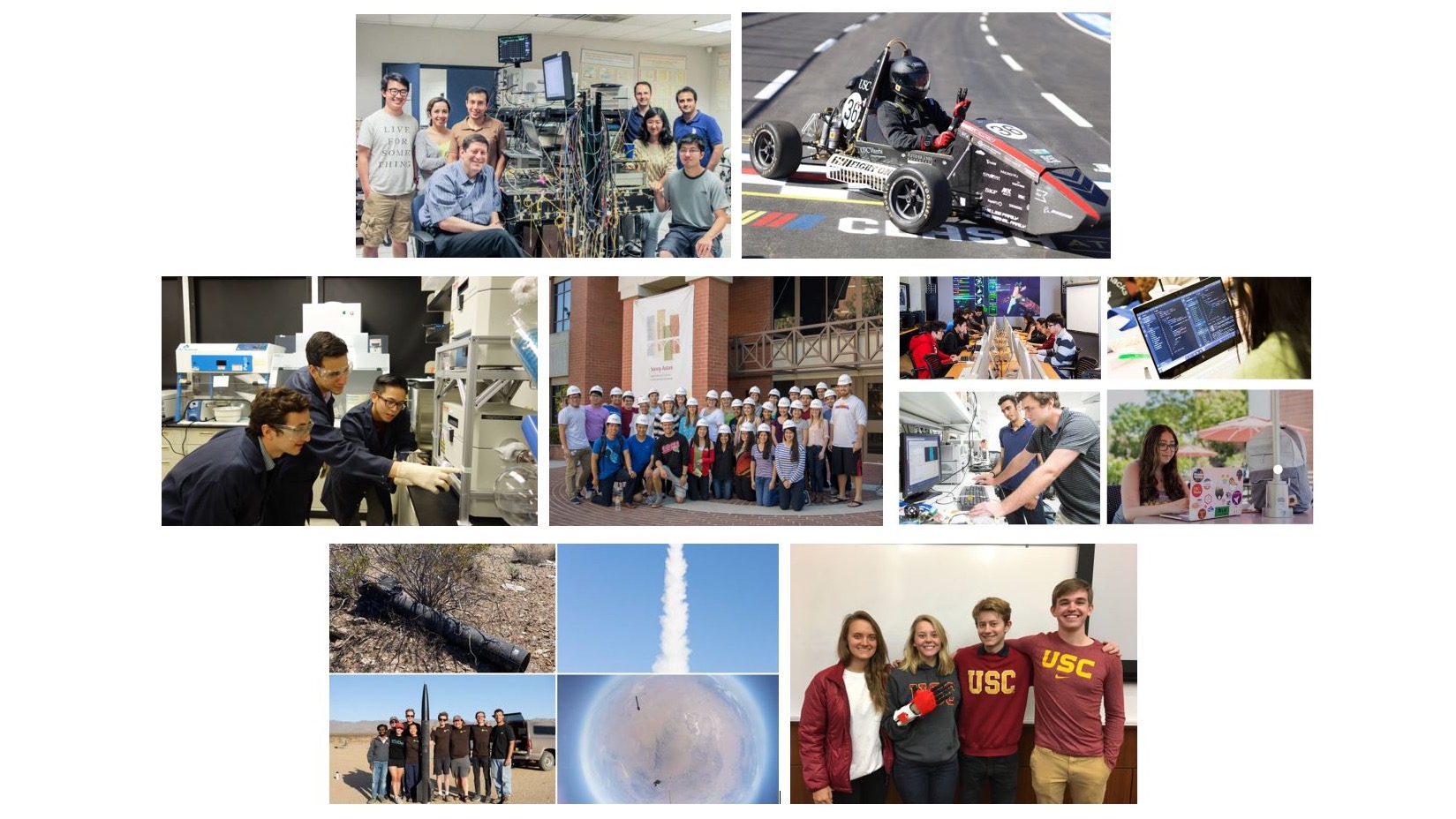USC Viterbi Departmental Frontiers of Computing Priorities
USC Viterbi Department of Aerospace and Mechanical Engineering
Aerospace and mechanical engineers design and build unique, complex mechanical-optical-electronic (mechoptronic) systems, ranging in scale from the International Space Station to microscale electric generators and pumping systems. A broad range of engineering science research is critical to developing novel, complex mechoptronic systems. As a consequence, aerospace and mechanical engineers conduct extensive basic and applied research within and crossing their usual disciplinary boundaries, they also synthesize research from many other disciplines. Supporting this department will advance computing in the Department of Aerospace and Mechanical Engineering.
USC Viterbi Department of Astronautical Engineering
Astronautical Engineering encompasses the dynamic and cutting-edge fields of advanced science and space technology. Space engineers design, build and operate rockets and missiles, space launchers, communications and direct broadcasting satellites, space navigational systems, remote sensing and reconnaissance satellites, space vehicles for human spaceflight, and planetary probes. Supporting this department will advance computing in the Department of Astronautical Engineering.
USC Viterbi Alfred E. Mann Department of Biomedical Engineering
Biomedical Engineering at USC conducts original biomedical research involving the development and application of engineering approaches in biology and medicine. Our students and faculty conduct cutting-edge research in a wide variety of areas, including biomedical devices imaging, cellular molecular bioengineering, mathematical/computational biosystems, and neuroengineering. Supporting this department will advance computing in the Alfred E. Mann Department of Biomedical Engineering.
USC Viterbi Sonny Astani Department of Civil and Environmental Engineering
From the highways and bridges you drive over, to the buildings you live and work in, to the systems that provide you access to clean water, civil and environmental engineers address the core needs of society. Civil and Environmental Engineering improves the quality of life, protect people from hazards and disasters, and solve global challenges. Supporting this department will advance computing in the Sonny Astani Department of Civil and Environmental Engineering.
USC Viterbi Mork Family Department of Chemical Engineering and Materials Science
Leveraging USC‚ high power computational cluster and national computational resources, our chemical engineering and materials science students and faculty members are solving problems related to bioinformatics, quantum material systems, and fluid/mass transport. Using bottom-up and top-down fabrication methods, they are developing new nanomaterials and nanotechnologies to unravel the quantum world for applications in security, healthcare, and energy. Supporting this department will advance computing in the Mork Family Department of Chemical Engineering and Materials Science.
USC Viterbi Thomas Lord Department of Computer Science
Researchers in artificial intelligence (AI) seek to understand and develop machines with human-level intelligence by exploring the academic and real-world challenges surrounding AI. At USC‚ Department of Computer Science, we are pioneering breakthroughs in a full spectrum of topics related to AI, including machine learning, computer vision and image processing, human-robot interaction, speech and language analysis, information extraction, and privacy-protection. Our faculty and student researchers are working in areas where artificial intelligence has been under study for decades‚ like language‚ and where the tools are just starting to make inroads‚ such as efforts to combat human trafficking, diagnose fetal alcohol syndrome, and prevent terrorist attacks using limited resources. Supporting this department will advance computing in the Thomas Lord Department of Computer Science.
USC Viterbi Ming Hsieh Department of Electrical and Computer Engineering (Electrophysics Fund)
The department is administratively divided into several major teaching and research groups: signal and image processing, communications, computer engineering, controls, and electrophysics. Research in signal and image processing includes: speech, audio, biological genomics/proteomics signal processing, compression, multimedia, human-computer interfaces, biomedical imaging, and neural and fuzzy theory. Research in communication theory and coding includes: optical, wireless, ultra-wideband (UWB) and spread spectrum communications, and quantum information processing (QIP). Computer engineering research topics include: VLSI design and CAD testing, digital transceivers, asynchronous logic, computer networks, wireless and sensor networks, computer architecture, reconfigurable computing, and systems. Other areas include control systems and transportation, photonics, electromagnetics, energy conversion, mixed-signal integrated circuits, micro electro-mechanical systems, and nanotechnology. Supporting this department will advance computing in the Ming Hsieh Department of Electrical and Computer Engineering (Electrophysics Fund).
USC Viterbi Ming Hsieh Department of Electrical and Computer Engineering (Systems Fund)
Controls, learning, autonomy, and robotics is about automation and intelligence. Control engineers design the algorithms and software that give systems agility and balance, as well as the ability to adapt, learn and discover when confronted with uncertainty. Control engineers create agile robots, vision-based navigation algorithms, congestion resistant data-networks, highway automation and air traffic coordination software, missile guidance systems, disk-drive controllers, efficiency optimizing engine electronics, and they are sought after for non-engineering applications such as economic forecasting and portfolio management. The theory of control is intimately intertwined with and includes the science of system identification, which concerns the creation of systems for intelligently reducing large amounts of experimental and historical data to simple mathematical models that can be used either for forecasting or to design automatic control systems. Supporting thus department will advance computing in the Ming Hsieh Department of Electrical and Computer Engineering (Systems Fund).
USC Viterbi Daniel J. Epstein Department of Industrial and Systems Engineering
The Daniel J. Epstein Department of Industrial and Systems Engineering prepares students to benefit society through innovation of systems, algorithms, and advanced quantitative methods. We achieve our mission through our teaching and research in decision-making and design methods for complex and uncertain environments. Statistics and machine learning focuses on advancing machine learning techniques to harness the massive amounts of data generated by contemporary systems, in order to solve important technological and societal challenges effectively and responsibly. Faculty and students engage in interdisciplinary research, combining ideas from probability, statistics and optimization, and develop cutting-edge methods. Topics include reinforcement learning, knowledge graphs, interpretable and fair artificial intelligence, reproducibility, algorithms for large-scale problems, and control-theoretic machine learning, as well as the applications of machine learning and statistics to manufacturing, healthcare and operational problems. Supporting this department will advance computing in the Daniel J. Epstein Department of Industrial and Systems Engineering.

